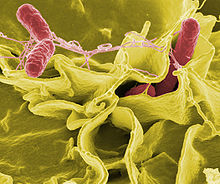 Following last week’s recall of 36 million pounds of ground turkey, we thought it’d be a good time to review the evidence on Salmonella poisoning.
Following last week’s recall of 36 million pounds of ground turkey, we thought it’d be a good time to review the evidence on Salmonella poisoning.
According to the U.S. Centers for Disease Control, the bacteria Salmonella live in the intestinal tracts of humans and other animals, including birds. People usually contract the bacteria by eating foods contaminated with animal feces, which typically look and smell normal even though they are carrying the bacteria. Salmonella is also be found in the feces of pets, especially, reptiles and young birds.
An estimated 1.4 million people contract Samonella poisoning every year in the U.S. A total of 107 cases in 31 states have been identified in the most recent outbreak spread by the ground turkey meat. Infection typically results in diarrhea, fever, and abdominal cramps 12 to 72 hours contact with the bacteria. The illness usually runs its course in 4 to 7 days, and most people don’t require treatment. But severe cases require hospitalization for dehydration.
So what’s the best way to prevent the spread of Samonella? The evidence shows there are some simple steps you can take to reduce your risk of Samonella poisoning.
- Cook poultry, ground beef, and eggs thoroughly.
- Wash hands, kitchen work surfaces, and utensils with soap and water immediately after they have been in contact with raw meat or poultry.
- Wash hands with soap after handling reptiles, birds, or baby chicks, and after contact with pet feces.
- Avoid direct or even indirect contact between reptiles and infants or immunocompromised persons.
Beyond these common-sense measures, researchers at Cornell are trying to do more. Two Cornell faculty members recently received a grant from the U.S. Department of Agriculture to study how tomato plants interact with the Samonella bacteria, with the hopes of eventually breeding new varieties of produce that suppress Samonella.
Until then, keep up the hand-washing!



Speak Your Mind